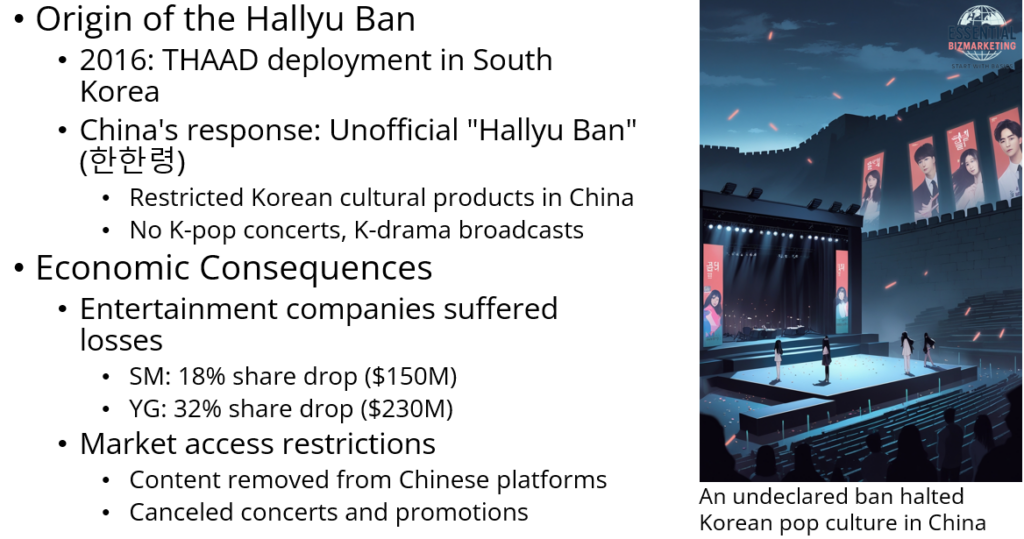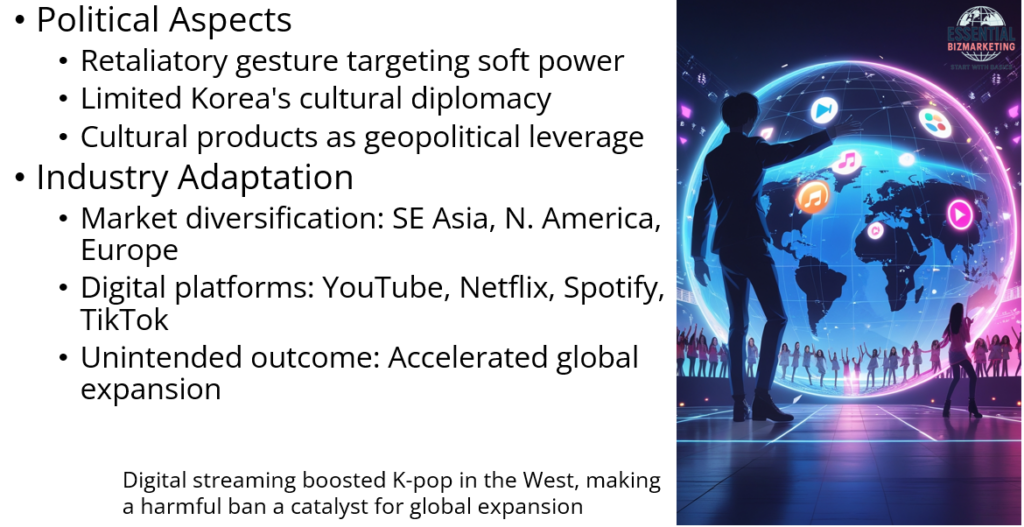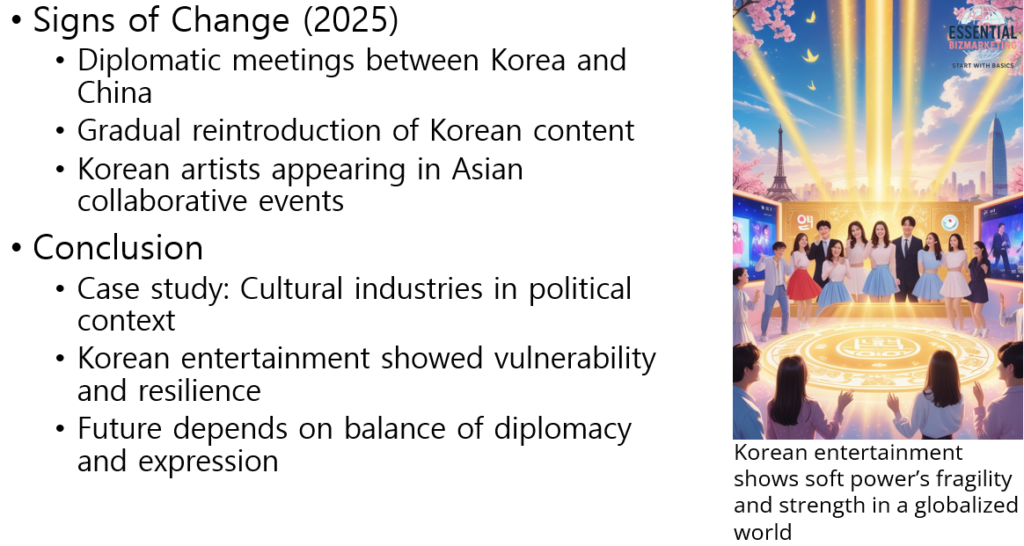Introduction: The Origin of the Hallyu Ban

In 2016, the deployment of the Terminal High Altitude Area Defense (THAAD) system in South Korea, supported by the United States, created a deep rift in diplomatic relations between South Korea and China. In response to what it perceived as a threat to its national security, the Chinese government unofficially imposed a set of restrictions on South Korean cultural products—a move widely referred to as the “Hallyu Ban” (한한령). Though never formally declared, the ban was far-reaching, effectively halting K-pop concerts, K-drama broadcasts, and other cultural exchanges in China. This incident underscored the powerful intersection of international politics, soft power, and the global entertainment economy.
Economic Consequences for the Korean Entertainment Sector
The economic consequences of this ban were immediate and substantial. Major Korean entertainment agencies suffered steep losses, with companies like SM Entertainment and YG Entertainment reportedly losing hundreds of millions of dollars in market value. SM’s share price fell by 18%, amounting to an estimated $150 million in losses, while YG saw a 32% decline, equating to nearly $230 million. Korean dramas and music videos were removed from Chinese streaming platforms, and Korean artists saw their concert schedules canceled across China, severely limiting their reach in one of the world’s largest markets. This not only impacted revenues but also disrupted strategic expansion plans across Greater China.
Political Motivations and Soft Power Dynamics

Politically, the Hallyu Ban was a clear retaliatory gesture. China aimed to apply economic and cultural pressure on South Korea by targeting its increasingly influential soft power sector. The popularity of K-pop and Korean dramas had, by this time, become symbols of South Korea’s cultural diplomacy and global brand. Restricting their access to the Chinese market served to limit South Korea’s cultural footprint and reminded Seoul of Beijing’s regional clout. It was a striking example of how cultural products can become bargaining chips in high-stakes geopolitical disputes.
Industry Response and Strategic Adaptation
In the face of these challenges, the Korean entertainment industry displayed notable resilience and adaptability. Rather than retreating, many entertainment companies diversified their market reach, shifting their focus toward Southeast Asia, North America, and Europe. Platforms such as YouTube, Netflix, Spotify, and TikTok became crucial tools for maintaining global engagement, bypassing traditional Chinese distribution channels. In fact, the globalization of digital streaming arguably accelerated K-pop’s rise in Western markets, suggesting that the ban, while damaging in the short term, may have inadvertently expanded the industry’s global influence in the long run.
Signs of Diplomatic Thaw and Policy Shifts in 2025

By early 2025, signs began to emerge that China may be softening its stance. A series of high-level diplomatic meetings between South Korean and Chinese officials has led to speculation about the lifting of the ban. Industry insiders are optimistic that access to Chinese platforms and audiences could soon resume, potentially opening the door to a new era of cultural cooperation and economic growth. Some Chinese state media have subtly reintroduced Korean content, and Korean artists have started appearing in collaborative events across Asia, signaling a possible policy shift.
Conclusion: Cultural Exchange in a Geopolitical Context
Ultimately, the Hallyu Ban offers a compelling case study in how cultural industries are not only shaped by consumer demand but also by the political climate in which they operate. The Korean entertainment sector’s ability to weather the restrictions and thrive elsewhere highlights both the vulnerability and strength of soft power in a globalized world. As diplomatic ties recover, the future of Korean cultural exports in China may well depend on a delicate balance between artistic expression and international diplomacy.
📚 Reference
Griffiths, J. (2017, October 31). China, South Korea end year-long diplomatic feud over missile system. CNN. https://www.cnn.com/2017/10/31/asia/china-south-korea-thaad/index.html
Jeong, H. (2025, February 20). Korean government anticipates Hallyu recovery with potential lifting of China’s ban [In Korean]. Seoul Economic Daily. https://www.sedaily.com/NewsView/2GP1KE47ND
Jozuka, E., & Han, S. (2017, February 23). Why South Korean companies, entertainers are getting cold shoulder in China. CNN. https://www.cnn.com/2017/02/23/asia/south-korea-china-thaad-retaliation/index.html
Kim, M. (2025, March 21). ‘Mickey 17’ by Bong Joon-ho released in China amid Hallyu Ban easing [In Korean]. Yonhap News Agency. https://www.yna.co.kr/view/AKR20250321158800009
Lee, J. (2025, March 16). APEC summit expected to accelerate thaw in Korea-China cultural relations [In Korean]. NoCut News. https://www.nocutnews.co.kr/news/6301067
Perlez, J., & Sang-Hun, C. (2017, March 9). South Korean stores feel China’s wrath as U.S. missile system is deployed. The New York Times. https://www.nytimes.com/2017/03/09/world/asia/china-lotte-thaad-south-korea.html
Qin, A., & Choe, S.-H. (2016, August 6). South Korean missile defense deal appears to sour China’s taste for K-pop. The New York Times. https://www.nytimes.com/2016/08/08/world/asia/china-korea-thaad.html
Smith, N. (2016, December 4). South Korea’s ‘K-pop’ stars caught in the crossfire of diplomatic spat with China. The Telegraph. https://www.telegraph.co.uk/news/2016/12/04/south-koreas-k-pop-stars-caught-crossfire-diplomatic-spat-china/
Yoon, B. H. (2025, February 20). Industry expects benefits if China lifts ban on Korean culture—Cosmetics, tourism, food sectors prepare for reopening [In Korean]. Yonhap News Agency. https://www.yna.co.kr/view/AKR20250220092500030
Yoon, B. H. (2025, March 21). Signs of China lifting the ‘Hallyu Ban’—President Xi and Wang Yi stress cultural exchange with Korea [In Korean]. Yonhap News Agency. https://www.yna.co.kr/view/AKR20250321158800009
📁 Start exploring the Blog
📘 Or learn more About this site
🧵 Or follow along on X (Twitter)
🔎 Looking for sharp perspectives on global trade and markets?
I recommend @GONOGO_Korea as a resource I trust and regularly learn from.
